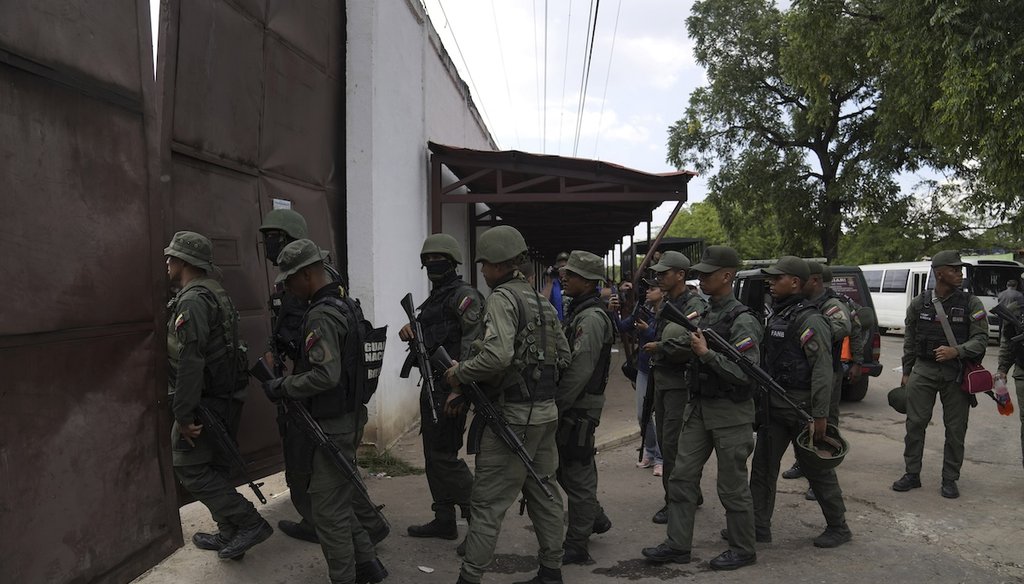Stand up for the facts!
Our only agenda is to publish the truth so you can be an informed participant in democracy.
We need your help.
I would like to contribute

Soldiers raid the Tocorón Penitentiary Center, in Tocorón, Venezuela, Sept. 20, 2023. The Tren de Aragua gang originated at the prison. (AP)
Former President Donald Trump’s 2024 presidential campaign has stoked fear about what he calls "migrant crime," despite a nearly 50-year low in violent crime and studies showing that immigrants commit crimes at lower rates than U.S. citizens. Approaching Election Day, Trump has zeroed in on one group — the Tren de Aragua Venezuelan prison gang.
Trump has falsely claimed the gang has taken over cities including Aurora, Colorado, and he has promised a mass deportation of its members using an 18th century law.
"Aurora probably is an even worse situation. You have the meanest, worst gang from Venezuela in the world, probably maybe as bad or worse than MS-13, and they've literally taken over the town," Trump said in an Oct. 29 speech. "They've taken over large sections of the town. They've gone into the real estate business. They've taken over apartment complex. They took over a number of complexes." La Mara Salvatrucha, aka MS-13, is a gang composed primarily of immigrants or descendants of immigrants from El Salvador, according to the U.S. Justice Department.
Local law enforcement agencies around the U.S. have arrested Tren de Aragua members and charged them with crimes including murder, theft and weapon offenses. But officials have also disputed characterizations that the gang is taking over cities.
Immigration officials have tracked Tren de Aragua gang member apprehensions at the U.S. border and found that four other groups, including MS-13, had more members apprehended there than Tren de Aragua had in fiscal year 2024, which ended Sept. 30.
David Pyrooz, a University of Colorado, Boulder professor and gang expert, said without minimizing the crimes Tren de Aragua members are accused of committing, the gang has become a "boogeyman."
Pyrooz said gang violence has existed in the U.S. for more than a century and that Tren de Aragua's crimes are "a drop in the bucket when it comes to the overall amount of gang violence and overall violence that occurs in this country."
Tren de Aragua "is this election cycle’s MS-13," he said, referring to Trump’s comments about that gang during his administration and the 2018 midterm elections.
Information about Tren de Aragua members in the U.S. is sparse, which makes the gang a fertile topic for inspiring hard-to-verify claims, he said.
InSight Crime, a think tank focused on crime and security in the Americas, said in an October report that "the gang’s reputation appears to have grown more quickly than its actual presence in the United States."
Here’s what we know about the organization’s origins and what we can and can’t say about its U.S. presence.
Tren de Aragua’s origins and its international expansion
Tren de Aragua is Spanish for "Train of Aragua." The gang started some time between 2013 and 2015 in Tocorón, a prison in the Venezuelan state of Aragua, according to Transparencia Venezuela, an anti-corruption nonprofit organization. The group asserted its power within the prison, building a dance club, restaurants and a zoo inside, according to the BBC.
In its first few years, the gang stayed within Venezuela, expanding its reach to different states. Its criminal portfolio then included kidnappings, extortions and theft, InSight Crime reported in July.
Around 2018, the group began expanding internationally. A mass exodus was beginning in Venezuela then, with people fleeing the country because of an economic and humanitarian crisis. Capitalizing on the situation, Tren de Aragua established itself at the Venezuela-Colombia border.
"Tren de Aragua began to systematically exploit Venezuelan migrants, charging them money and clandestinely taking them to Colombia," InSight Crime wrote. "They began taking control of various nodes of the human trafficking market with the objective of sexual exploitation."
Now, Tren de Aragua has established networks in Colombia, Peru and Chile, and is reportedly present in Ecuador, Bolivia and Brazil. In September 2023, Ronna Risquez, a Venezuelan investigative journalist who published a book about Tren de Aragua, said there were collectively more than 3,000 Tren de Aragua members in the countries it operates in.
Venezuelan immigrants have often been the group’s main victims, Risquez said in an Oct. 7 Univision podcast.
In September 2023, thousands of Venezuelan police officers and military members executed a raid in Tocorón, seeking to regain control of the prison. Tren de Aragua’s leader, Héctor Rustherford Guerrero Flores, who uses the alias "Niño Guerrero," had been imprisoned at Tocorón. But he escaped during the raid, and now his location is unknown, according to InSight Crime.
For months Trump has claimed, without evidence, that countries such as Venezuela are emptying prisons and sending their criminals to the U.S. Risquez said in the podcast that the claim is unsubstantiated, adding that Venezuela has no such policy.
What is known about Tren de Aragua’s presence in the U.S.
Information about Tren de Aragua’s presence in the U.S. is increasing, but its scope is limited. What we know comes mainly from law enforcement officials and news reports.
The New York Times, citing unnamed sources, reported that the Department of Homeland Security said federal officials have worked on 100 investigations related to the gang this year. Nationwide, officers have made more than 50 arrests. News reports show local law enforcement has arrested Tren de Aragua members in several U.S. states, including Texas, Colorado and New York.
New York City Police Department Chief John Chell told WNBC-TV on Oct. 23 that the department has identified 40 Tren de Aragua members in the city, and he said there are likely more. Police in Aurora, Colorado, said in a Sept. 26 statement that the department had identified 10 Tren de Aragua members in the city.
But Pyrooz said there is no clear information about how many Tren de Aragua members are in the U.S. or how organized they are.
Risquez said in the podcast that there is clearly a presence of Tren de Aragua members in the U.S. given local law enforcement reports. But that isn’t the same as the gang having an official U.S. operation, she said.
For example, it’s unclear whether gang members who have committed crimes are doing so as part of a coordinated group effort; "or if it's more of an opportunistic, fleeting pursuit of a criminal opportunity of certain members of this group," Pyrooz said.
According to The New York Times, the New York City Police Department is working to create a profile of the gang’s operations in the city, including its recruitment tactics in migrant shelters and its communication via WhatsApp groups. The department says Tren de Aragua has been involved mainly in criminal thefts and dealing Tusi, a synthetic drug.
U.S. Customs and Border Protection began tracking Tren de Aragua apprehensions at U.S. borders in March 2023. From then through September 2023, the agency apprehended people affiliated with the gang 41 times. In fiscal year 2024, which ended Sept. 30, the agency reported 27 apprehensions.
People identified at the border as gang members are detained by immigration officials or referred for criminal prosecution, the White House said in a July statement.
NBC News reported Oct. 23 that the Department of Homeland Security had identified 600 people nationwide who might have ties to Tren de Aragua. Of those, 100 were confirmed members.
Because of fraught diplomatic relations with the U.S., Venezuela doesn’t share its intelligence or criminal records. This makes it difficult for U.S. immigration authorities and law enforcement to confirm whether someone is a Tren de Aragua member, an October InSight crime report said.
Pyrooz said more information about Tren de Aragua is necessary to better assess the gang’s power in the United States and elsewhere. Particularly important, he said, would be knowing how many members are in the U.S.; whether different sects of the group have established themselves around the country and whether they’re coordinating with one another; and what crimes the group is involved in.
On July 11, the Treasury Department designated Tren de Aragua as a significant transnational criminal organization. The designation enables the U.S. government to block the group’s assets in the U.S. That same day, the State and Justice departments announced a reward of up to $12 million for information leading to the arrests or convictions of three Tren de Aragua leaders.
Our Sources
PolitiFact, Joe Biden is correct that violent crime is near a 50-year low, May 28, 2024
PolitiFact, What’s behind recent false claims about immigrants and crime?, Sept. 27, 2024
Mike Coffman, Aurora Mayor, Statement, Oct. 8, 2024
PolitiFact, City officials and residents say there is no Venezuelan gang "takeover" in Aurora, Colorado, Sept. 9, 2024
PolitiFact, Can Donald Trump use a 1798 law to carry out mass deportations?, Oct. 18, 2024
KXAS-TV, Men charged for North Texas murder said to be in Venezuelan gang, police say, Oct. 29, 2024
The New York Times, A Venezuelan Gang Reaches New York, Sept. 23, 2024
WMAQ-TV, What is Tren de Aragua? What to know about Venezuelan gang at center of recent headlines, Sept. 3, 2024
El Paso Times, City leaders disputes claim El Paso infested with Venezuelan gang activity, Sept. 19, 2024
Aurora, Colorado City Government, Statement, Aug. 30, 2024
Transparencia Venezuela, Tren de Aragua, accessed Oct. 31, 2024
BBC News Mundo, El lujo que vi cuando entré en la cárcel de Tocorón, el búnker del temido Tren de Aragua en Venezuela, Oct. 3, 2023
InSight Crime, Tren de Aragua, July 12, 2024
Human Rights Watch, The Venezuelan Exodus, Sept. 3, 2024
El Diario, Ronna Rísquez, la periodista que se adentró en las fauces del Tren de Aragua, March 18, 2023
BBC News Mundo, "Intervenir la cárcel de Tocorón no significa el fin del Tren de Aragua": la megaoperación del gobierno de Venezuela con 11.000 efectivos para controlar el "búnker" de la organización criminal, Sept. 21, 2023
PolitiFact, Trump’s ridiculous claim that "millions" of immigrants came illegally from jails, mental facilities, June 6, 2024
Aurora Police Department, APD Arrests TdA Member on Warrants, Sept. 26, 2024
WNBC-TV, NYPD details plan to target ‘Tren de Aragua' gang, Oct. 23, 2024
Univision, Contrapoder, con Jorge Ramos, Oct. 7, 2024
U.S. Customs and Border Protection, CBP Enforcement Statistics, accessed Oct. 31, 2024
White House, Statement from NSC Spokesperson Adrienne Watson on U.S. Actions Against Transnational Criminal Organization Tren de Aragua, July 11, 2024
NBC News, DHS is seeking more than 600 migrants for possible ties to Venezuelan gang, Oct. 23, 2024
InSight Crime, What We Know About Tren de Aragua’s US Presence, Oct. 4, 2024
U.S. Department of the Treasury, Treasury Sanctions Tren de Aragua as a Transnational Criminal Organization, July 11, 2024
U.S. Department of State, Up to $12 Million in Reward Offers for Information Leading to Arrests and/or Convictions of Three Leaders of the Tren de Aragua Transnational Criminal Organization, July 11, 2024
The Christian Science Monitor, Is a Venezuelan gang growing in the US? Colorado feels the threat., Sept. 13, 2024
The Texas Tribune, What you need to know about the Venezuelan gang that Texas is targeting, Sept. 18, 2024
The New York Times, Venezuelan Gang’s Path to U.S. Stokes Fear, Crime and Border Politics, Sept. 22, 2024
InSight Crime, US Labels Tren de Aragua a Transnational Criminal Threat, July 11, 2024
Reuters, Explainer: What is the Venezuelan prison gang Tren de Aragua?, July 11, 2024
CNN, Biden administration designates dangerous Venezuelan gang as a transnational criminal organization, July 11, 2024
KMGH-TV, Tren de Aragua 'components' operating in Aurora but 'reports of TdA influence' are isolated, city says, Aug. 29, 2024
AP News, Tren de Aragua gang started in Venezuela’s prisons and now spreads fear in the US, Sept. 24, 2024
CNN, This is the dangerous Venezuelan gang infiltrating the US that you probably know nothing about but should, June 10, 2024
NBC News, 'Ghost criminals': How Venezuelan gang members are slipping into the U.S., June 12, 2024
Phone interview, David Pyrooz, Professor at University of Colorado Boulder, Oct. 29, 2024


































